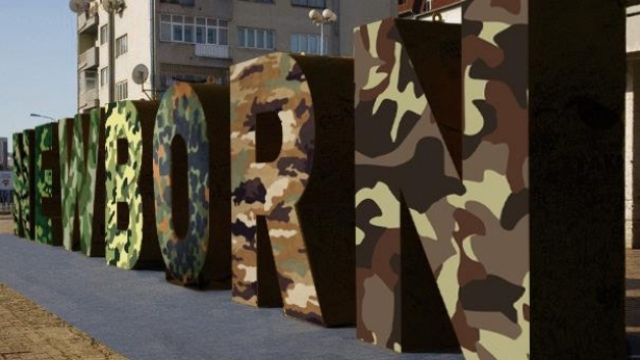
Six years after Kosovo proclaimed its split from Serbia, thousands of people gathered in central Pristina on Monday to celebrate the anniversary and watch a parade staged by the Kosovo Security Forces.
Ahead of the parade, Prime Minister Hashim Thaci announced that a new military institution called the Kosovo Armed Forces would be set up to replace the security forces “in the upcoming weeks or months”.
“The Kosovo Armed Forces will protect Kosovo’s sovereignty and its integrity,” Thaci said.
Meanwhile schools and shops were closed and the flags of Kosovo and allies Albania and the United States were raised on the streets of Pristina, while the showpiece ‘Newborn’ monument in the capital, installed in 2008 to mark the independence declaration, was painted in army camouflage colours “in memory of those who sacrificed their lives” so the state could be born, said its creator, Fisnik Ismaili.
The past year has seen signs of a thaw between Pristina and its former masters in Belgrade, with an EU-brokered agreement signed in Brussels last April pushing Serbia to give up control over the northern part of Kosovo which it retained since the end of conflict in 1999.
“The sixth anniversary marks a new chapter for Kosovo – one of normalizing relations between Kosovo and Serbia,” Thaci said on Friday.
The authorities in Pristina claim that Kosovo has been recognized by 106 countries, but UN membership remains a long way off.
Pristina is currently holding Stabilization Association Agreement talks with Brussels in a bid to move closer to European Union membership, but five EU countries, Spain, Greece, Romania, Slovakia, and Cyprus, still refuse to recognize Kosovo’s statehood.
Thaci however expressed optimism that this would change.
“The number of recognitions is increasing and I am convinced that Serbia will also recognize the country in the not distant future, parallel to the European integration process,” he said.
But despite improving relations with Serbia, Kosovo still faces huge economic problems, with a high level of corruption deterring foreign investors and hindering growth.
In its last ‘Corruption Perception Index’, watchdog organization Transparency International’s ranked Kosovo 111th out of 176 countries worldwide.
Unemployment also remains high, with more than 30 per cent of the population jobless.
Half the population is under 25, and 70 per cent of people are under 30. Every year 30,000 more young people enter the labour force, competing for a mere 5,000 jobs, causing large-scale emigration in search of employment.
USAID has called the situation a “virtual recipe for unrest”.
“We have to create the necessary conditions for economic development and foreign investments which will help our future generations to contribute to their country,” Kosovo President Atifete Jahjaga said on Sunday, the day before the sixth anniversary./balkaninsight/